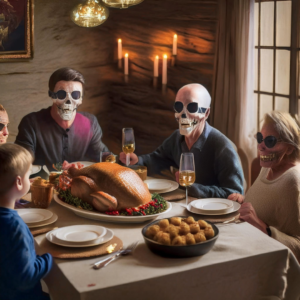Terrifying Thanksgiving Tales
The Spirit of Thanksgiving By Claudia Alick
When I was six, I had a revelation during Thanksgiving. The holiday, I realized, was a perfect encapsulation of everything wrong with society: narrow, prescribed gender roles, capitalist competitions, and hierarchical dominance performances. I was exceptionally smart and observant. Because of this, I found it difficult to connect with kids my own age, often feeling out of place in their company. Instead, I spent my time floating between the kitchen and the living room, the garden and the garage.
I noticed how the spaces were sharply gendered. The women were almost always doing all the labor: cooking, cleaning, organizing, and entertaining. The men, meanwhile, played games, watched games, or talked shop. When the meal was ready, they would ceremoniously carve the turkey, acting as though they—and not the women—were responsible for the feast.
This was the first year I wasn’t considered “cute.” I had always been a patient and persistent child, planning and investigating, setting my dominoes into motion over the years. My cuteness had served as camouflage, allowing me to observe unnoticed. People often underestimated me, freely sharing their thoughts, assuming my child’s mind couldn’t understand. But this year, I knew I would have to act. It was time to pull the pin and put my plans fully into motion.
I saw the world like a computer, full of inputs and outputs. I resented the unnecessary limitations imposed on me because of my gender. The behavioral scripts expected of women didn’t align with my reality. I didn’t feel like a man, but I envied the freedom to act as one. Faced with a system offering only a limited set of choices, I decided to break it. My methods had to be covert, seemingly cooperative with society’s expectations. I overclocked the system until it imploded.
That Thanksgiving, my carefully laid plans culminated. I triggered everyone into extreme performances of their gender and racial identities. The women leaned into their roles as tireless caregivers; the men puffed up with dominance and entitlement. The family’s latent supremacy culture bubbled to the surface. I hadn’t anticipated the toxic combination of alcohol and suppressed bigotry. When I questioned my uncle’s sexual identity, he snapped. Like a grotesque caricature, he grabbed me by the neck, choking me in a rage that mirrored Bart Simpson’s cartoon antics. Only, this wasn’t funny. It escalated into a full-blown family brawl, with plates shattering and accusations flying.
Furniture toppled, and punches were thrown as chaos erupted in the dining room. Insults hurled back and forth, mingling with food launched across the table. Someone’s mashed potatoes hit the wall with a splat, while others screamed accusations and threats over the din. Amid the madness, there were bursts of hysterical laughter from some, as though the absurdity of it all had cracked their sanity. I ended up face down in the mashed potatoes, unnoticed, while the rest of them continued their battle, oblivious to the impact of their actions.
The big reveal? I’m telling this story from the afterlife. My uncle killed me in the most absurd, cartoonish way imaginable. Despite the tragedy, I can’t help but find a macabre sense of humor in the whole ordeal. Now, I haunt family Thanksgivings where daughters’ talents and greatness are suppressed, where competition festers instead of cooperation, and where material possessions matter more than people.
My hauntings are not the kind of ghostly whispers and fleeting shadows you’d expect. No, I create elaborate horror shows designed to hold a mirror to the family’s dysfunction. The dining table becomes a grotesque carnival ride, spinning with distorted laughter as the turkey mocks the guests. Gravy pours like a viscous river, drowning their prized heirlooms and fine china. Plates and utensils rise, clattering together in a symphony of chaos.
I amplify the petty arguments, twisting them into nightmarish chants that echo through the house. Insults hurled over the years manifest as spectral figures, replaying the cruelest moments in vivid, undeniable detail. I turn their prized dishes into monstrous creations—green beans slither like serpents, cranberries pulse with a heartbeat, and the stuffing gurgles like a swamp beast.
For the children, I show them visions of their potential futures: the unacknowledged dreams, the endless cycles of conformity. For the adults, I force them to relive the impact of their choices, to feel the weight of every overlooked kindness and every harsh word. The house itself groans under the pressure, its walls sweating with regret and its windows fogged with despair.
And yet, there’s always a moment of clarity. As the terror subsides, I whisper lessons in their ears, planting seeds of change. Those who listen find their Thanksgivings transformed forever, filled with cooperation, love, and genuine gratitude. But for those who don’t… I’ll see them again next year.
If you see a mysterious little child having a quiet conversation with a relative during Thanksgiving, beware.
Beware the Spirit of Thanksgiving.

